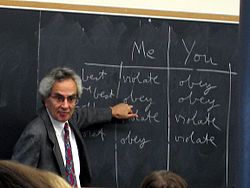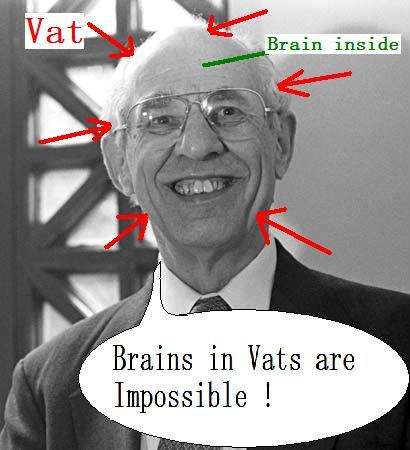Thomas Nagel wrote one lucky paper back almost half a century ago, titled “What Is it Like to Be a Bat?”. That title went down so well, he has basically made a living from this alone ever since. Recently, he went fully down the path trodden by many a noble prize winner: Pseudoscience! I did also not believe this initially, but do read outtakes (e.g. here) from his 2012 book “Mind and Cosmos” if you don’t believe me: It is not academic sophistry that reformulates “causality” to give meaning to “teleology”, but Thomas indeed, don’t fall from your chair now, advances arguments from incredulity and plain ignorance; likely got too cozy around the “intelligent design” (ID) crowd he explicitly recommends since 2008 at least. I will make comments that go against the usual treatments you can find easily elsewhere, where the usual suspects predictably burn Nagel because he dared to touch their caricature of Darwinism while Antidarwinism that dominates progressive science outreach is never touched. I will critique “teleology” without falling for an angry-new-atheist type Darwinism – let me quote my worst from below so knee-jerk pseudo-skeptics can move on right away:
The quantum universe has no time dependence and no wave function collapse is necessary for measurement events to emerge via relative decoherence … fundamentally, nothing is ever selected and thus Darwinism as natural selection in some box-lever-pulley mechanistic vulgar-atheist nightmare is strictly wrong!
With that out of the way, punters know that I support ID entering the curriculum (I do), so let’s go on with the few confused souls still left reading:
1) Postmodernists are derided as anti-science. Whatever people do not understand and thus claim about the analysis of science as a language-game and social construct, one aspect should be clear: Jacques Derrida would have never fallen to the level of Nagel (who officially counts as more of a philosopher of science, for crying out loud) and creationists, namely founding a critic of Darwinism on basic misunderstandings around biochemistry and probability. An analysis of such depth that certain parallels between primitive perspectives and science can be expressed in valid ways is a very different animal from holding a primitive perspective! No young-earth creationists sport ‘I heart Derrida’ bumper stickers, but many less criticized “philosophers” and scientists are favorites among such simpletons. Dear defenders of science: get your priorities straight! Postmodernism isn’t the problem; naivety is, the type of naivety that postmodern thinkers keep pointing out.

2) As you could have predicted, “philosophers” defend Nagel, of course, inflating BS instead of shooting it down is how they make a living. They agree, Thomas should not have written those facepalm inducing sections lacking highschool science, but still, his invoking teleology supposedly has merit (see for example here on the Prospect Magazine blog). Positivism has implicitly destroyed “teleology” 100 years ago, but socially selected “philosophers” are precisely those who do not grasp it, because Wittgenstein’s ‘what we cannot talk about we must go over in silence’ is incompatible with publish-or-perish.
3) I truly had it with the Hilarious Putnams; I decline to take them seriously just because they are famous! Life is too short for nonsense! I am done with submitting to PC suck-up-professionalism, being forced to quote big names who inflated sophistry and whose intellectual spawn rejects meaningful contributions anyway, regardless how much you water it down to relate to the “relevant literature” (F’ you feeling-all-important editors from “philosophy of science” journals; before pretending to be able to “read between” the lines, learn to read what is written on the lines, then start grasping why “philosophy” is not taken seriously anymore!). There is nobody in academic “philosophy” or anywhere else prominently visible, who can be cited without immediately distancing oneself; else an enlightened audience may well suspect you support nonsense. The homogenization through selection mechanisms is so efficient, insight is systematically ignored and suffocated under the sheer volume of mere re-re-re-interpretations. The serious thinker must go it alone and accept to be excluded as a crackpot on the fringe. It is that or supply yet another upper-class windbag.
 Hilarious Putnam
Hilarious Putnam
4) “Teleology” of the anti-scientific Nagel/creationist type is nonsense. Academic journals may survive on pretending that a knife-fight with guns is conceivable. What allegedly has been shown to fail by mediocre writers of the Popper kind is urgently necessary positivism: Shootouts are simply not called “knife battles”, so get your damn language in order.
Let’s say we figured it all out, and thus found how logic requires mathematical structures which allow and imply a perspective from the inside that feels like observing. Let’s say that the consistency of it includes that in a physicalist version, much like inevitably finding an inter-subjective “reality out there”, intelligent beings in some futures do make computers to then simulate all phenomenally possible states of minds in virtual realities, and assume that we describe satisfactorily how in all fundamentally meaningful descriptions, there is no difference between those simulated situations and “the real thing out there” (in fact, quantum physics already arrived at that simulation and creation are indistinguishable in QM computing, so at least this Leibnizian/Lewisian‘craziness’ can finally be put in fashionably sciency terms).
Would this imply or be “teleology” and the proof of god and that he is self-created with us being part of the divine? To my mind, it would just be a quirk of logic like the shape of the Mandelbrot set.
“Teleology” is the concept of a mechanistic causality which is not reasons ‘pushing constraints together’ so to produce certain outcomes (constraints which are thus ‘already there’ via their effects). Instead, teleological cause ‘pulls it together’ to fit a shape that kind of ‘sucks from the future’, a future which however does not yet “exist” (which to reasonable minds is language which indicates that something cannot have any effects). Of course, if we work hard, we can define suitably so that some of this is rendered meaningful in the context of ad hoc language. However, to those who prefer powerful terminology consistent with good science, “time” is based on causality. Time is not an arrow though a four dimensional box where people with an engineering mindset ask “Oh I wonder why stuff doesn’t flow the other way?” Time’s direction summarizes causal order and has no further meta-time to flow at all! So, even with circularity in a wider causal network, causality defines the local past-to-future order and thus direction. Teleology is nonsense, because past-to-future is nothing but different words expressing causal order. A holistic global constrain through consistency of the overall story is no longer about dynamical causes, and it is thus not valid to claim “seeeee, teleology after all”. No, once you have circularly correlated descriptions, there is no longer a globally valid absolute “future”. For example, if I am the exact same as that what will be simulated in “the future”, the “future” is right now, because I am now.
5) The fundamental description, by definition, is comprehensively including all possible alternatives equivalently, and although this is not due to quantum physics but self-evident tautology [TMR], in scientistic fashionable terms we may write that “the quantum universe has no time dependence and no wave function collapse is necessary for measurement events to emerge via relative decoherence” or some such potentially wrong statement. Whatever, fundamentally, nothing is ever selected and thus Darwinism as natural selection in some box-lever-pulley mechanistic vulgar-atheist nightmare is strictly wrong!
Even if we should confirm ID, for example hints about our existence being simulated by technology that we find ourselves trying to develop, which is conceivable, this does not imply that evolution is wrong. Assuming naïve realism needs evolution, of course, but evolution should not require a realism that has been proven false. Evolution belongs to the causal order in empirical records, one that is found precisely because of some overall consistency that we are not yet able to satisfactorily describe.
That global constraints from self-consistency of the whole do correlate past and future in more fundamental descriptions is obvious but not “teleology”! We usually find a history compatible with a physical causal account about that the past “actually happened”, rather than being merely a 'just so story' that grounds our meaningful understanding of the empirical record (in terms of them being our memories) somewhat plausibly. The fundamental question is about how empirical records may be described as constrained to be like this in the light of (relative to) the “this is my memory” perspective.



Comments